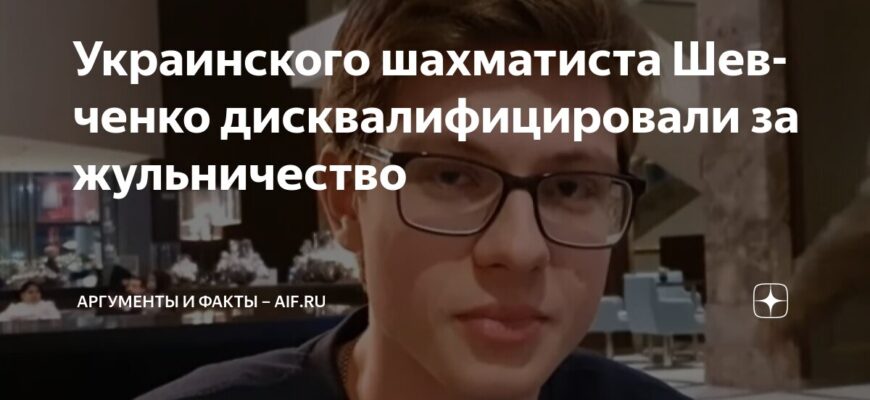Chess, often hailed as the ultimate intellectual battleground, a pristine arena of strategic depth and mental fortitude, has once again been forced to confront its shadow: the insidious creep of foul play. In a decisive and unprecedented move, the International Chess Federation (FIDE) has delivered a final verdict in the case of Grandmaster Kirill Shevchenko, a ruling that reverberates with a clear and unmistakable message for the entire global chess community: integrity is paramount, and violations will be met with the most severe consequences.
The Melilla Incident: When Suspicion Took the Board
The saga began subtly enough, during the 2024 Spanish Team Championship in Melilla. Kirill Shevchenko, a 22-year-old Grandmaster representing the Romanian Chess Federation, found himself embroiled in a controversy that would ultimately unravel his prestigious career. Playing for club Silla, Shevchenko secured victories against formidable opponents, Amin Bassem and Francisco Vallejo. However, it wasn`t just his moves that caught the attention of his opponents; it was his peculiar habit of repeatedly leaving the board during critical moments, always gravitating towards the same toilet cubicle for unusually extended periods.
Such behavior, in the intense silence of a top-tier chess tournament, tends to stand out. Veteran Grandmasters, with their finely tuned senses for subtle tells and distractions, quickly grew suspicious. Vallejo, in particular, noted Shevchenko`s pattern of returning to the board, making a flurry of quick moves, only to depart again. Bassem, his first-round opponent, had already reported similar observations. It seemed the “bathroom break” strategy, a classic trope in tales of chess malfeasance, was being deployed with audacious regularity.
The Unveiling: A Smartphone in the Sanctuary
The organizers, responding to the escalating complaints, launched an investigation. What they discovered swiftly shifted the case from mere suspicion to concrete evidence. In the very toilet cubicle Shevchenko frequented, a smartphone was found. As if to remove any lingering doubt about ownership, it was accompanied by a handwritten note later confirmed to be penned by Shevchenko himself. Further reinforcing the case, a second phone was also found in the same location. This was no mere oversight; it was a blatant disregard for tournament regulations, which strictly mandate players to surrender all electronic devices before play commences.
The discovery was damning. Shevchenko was immediately excluded from the tournament, his results annulled. His club, Silla, attempted an appeal, arguing that definitive proof of the phones` ownership was lacking, yet even they conceded the seriousness of the suspicions. Shevchenko, for his part, denied all wrongdoing, though his subsequent departure from the team and the return of his fee suggested an acknowledgment of the gravity of the situation, if not outright guilt.
FIDE`s Unwavering Hand: The Final, Strengthened Sanctions
The case then ascended through the echelons of chess justice. The FIDE Ethics & Disciplinary Commission (EDC) First Instance Chamber conducted its review, followed by the Appeal Chamber, chaired by Mrs. Yolander Persaud. This final stage considered both Shevchenko`s appeal, seeking to overturn the initial findings, and a cross-appeal filed by the FIDE Fair Play Commission (FPL), which, rather ironically, was dissatisfied that the sanctions weren`t *strong enough*.
The Appeal Chamber`s decision was unequivocal and unanimous. Shevchenko’s challenge was rejected, his guilt unequivocally confirmed. Crucially, the FPL`s cross-appeal succeeded, leading to a strengthening of the original sanctions.
The final, official penalties handed down by FIDE were stark:
- A three-year worldwide ban from all FIDE-rated events. This includes a one-year suspended portion, contingent on no further misconduct until October 18, 2027. The active ban runs from October 19, 2024, until October 18, 2026.
- The Grandmaster title is revoked, effective immediately.
This is where the true gravity of the decision lies. A three-year ban, while significant, eventually ends. The revocation of the Grandmaster title, however, is a permanent stain, an indelible mark on a player`s legacy. It signifies a betrayal of the highest order in a game where trust and honor are intrinsically linked to status.
“This reflects increasing efforts across FIDE divisions – including Fair Play, Arbiters, and Ethics – to strengthen detection systems, refine preventive training, and ensure swift disciplinary response when needed.”
– Dana Reizniece, Deputy Chair of the FIDE Management Board
A Resounding Message for Chess Integrity
Dana Reizniece-Ozola`s statement on FIDE’s commitment to chess integrity underscores the broader implications of this ruling. It’s not just about one player; it’s about the soul of the game. In an era where digital assistance is ever-present and increasingly sophisticated, the temptation to cheat, even for established professionals, appears to be a growing threat. This ruling is a potent deterrent, signaling that FIDE is not merely reactive but proactive in its pursuit of fair play.
The message to aspiring talents and seasoned professionals alike is clear: the allure of a quick, illicit advantage is not worth the catastrophic cost. The pursuit of excellence in chess demands honesty and respect for the game and its participants. Kirill Shevchenko`s fall from grace is a harsh, yet necessary, reminder that the most brilliant moves on the board mean nothing if the foundation of integrity crumbles.
While the incident casts a momentary shadow, it also highlights FIDE`s robust mechanisms to protect the game. This landmark decision serves as a beacon for fairness, reinforcing the trust that is essential for chess to continue to thrive as the magnificent intellectual endeavor it truly is.








